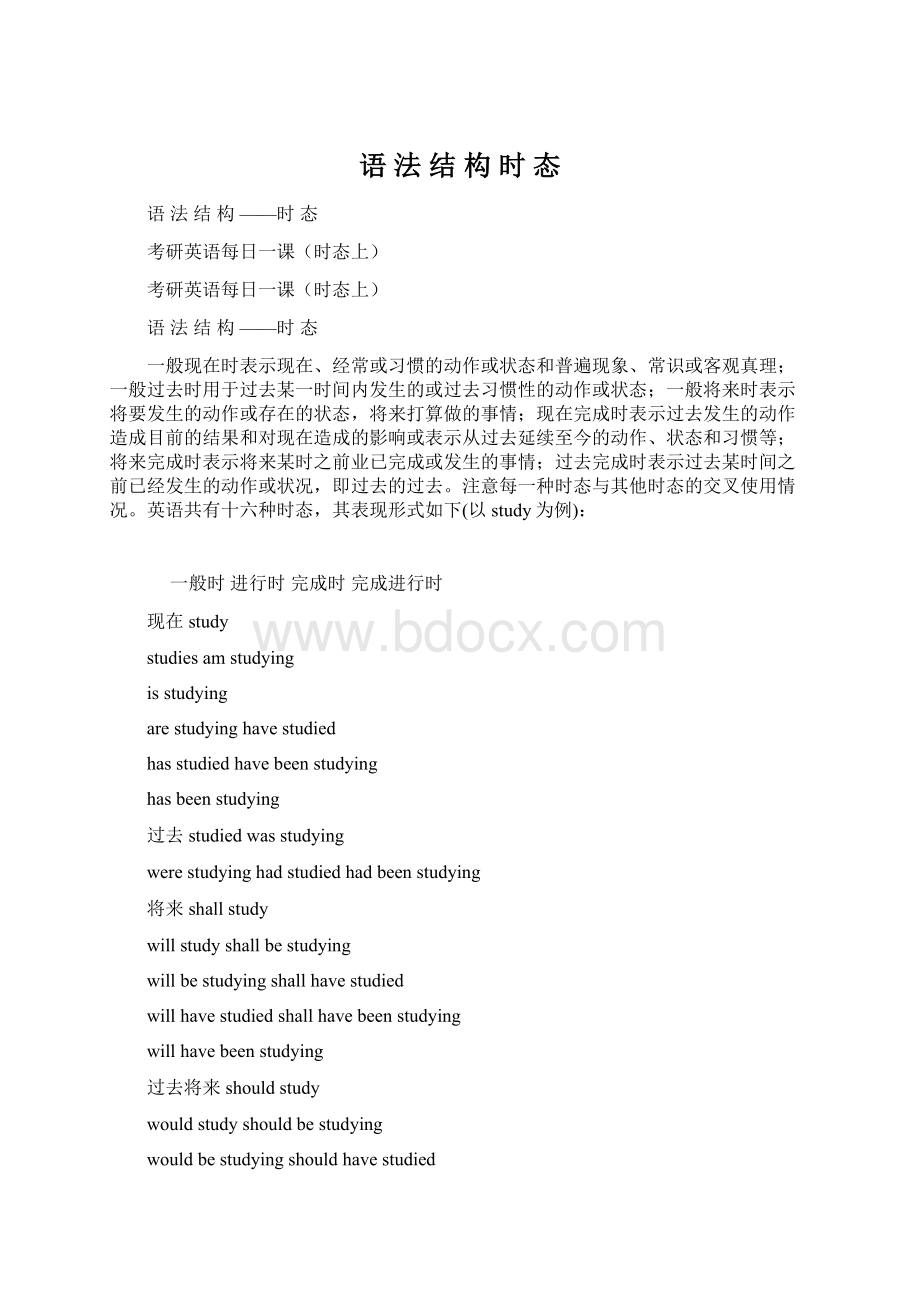语 法 结 构 时 态.docx
《语 法 结 构 时 态.docx》由会员分享,可在线阅读,更多相关《语 法 结 构 时 态.docx(10页珍藏版)》请在冰豆网上搜索。

语法结构时态
语法结构——时态
考研英语每日一课(时态上)
考研英语每日一课(时态上)
语法结构——时态
一般现在时表示现在、经常或习惯的动作或状态和普遍现象、常识或客观真理;一般过去时用于过去某一时间内发生的或过去习惯性的动作或状态;一般将来时表示将要发生的动作或存在的状态,将来打算做的事情;现在完成时表示过去发生的动作造成目前的结果和对现在造成的影响或表示从过去延续至今的动作、状态和习惯等;将来完成时表示将来某时之前业已完成或发生的事情;过去完成时表示过去某时间之前已经发生的动作或状况,即过去的过去。
注意每一种时态与其他时态的交叉使用情况。
英语共有十六种时态,其表现形式如下(以study为例):
一般时进行时完成时完成进行时
现在study
studiesamstudying
isstudying
arestudyinghavestudied
hasstudiedhavebeenstudying
hasbeenstudying
过去studiedwasstudying
werestudyinghadstudiedhadbeenstudying
将来shallstudy
willstudyshallbestudying
willbestudyingshallhavestudied
willhavestudiedshallhavebeenstudying
willhavebeenstudying
过去将来shouldstudy
wouldstudyshouldbestudying
wouldbestudyingshouldhavestudied
wouldhavestudiedshouldhavebeenstudying
wouldhavebeenstudying
考试中出现的一般有以下几种。
I、一般现在时
一、表示一般性或经常发生的动作或状态
1)Ingeneral[A],newspapersemphasizecurrentnews,whereas[B]magazinesdealt[C]morewith[D]backgroundmaterials.
2)Theadultmosquitousuallylivesforabout[A]thirtydays,although[B]thelifespanvaried[C]widelywithtemperature,humidity,andother[D]factorsoftheenvironment.
3)Industrialbuyers[A]areresponsible[B]forsupplying[C]thegoodsandservicesthatanorganizationrequired[D]foritsoperations.
二、表示习惯性动作和状态或普遍的现象或常识
4)Itisanaccepted[A]custominwestcountriesthat[B]menremoved[C]theirhatswhenawomanenters[D]theroom.
5)Certainlayersoftheatmospherehavespecialnames.
[A]whichindicatedtheircharacterproperties
[B]whosecharacteristicpropertieswereindicating
[C]whatcharacterizetheirindicatedproperties
[D]thatindicatetheircharacteristicproperties
三、表示客观事实、客观规律和客观真理。
在宾语从句中,即使主句的谓语动词用了过去时,只要从句表示的是客观真理,从句的谓语动词也要用一般现在时
6)Theteachertoldthemsince[A]lighttravelsfasterthan[B]sound,lightningappeared[C]togobefore[D]thunder.
7)As[A]achild,Iwastoldthat[B]theplanetearth,whichhas[C]itsownsatellite,themoon,moved[D]roundthesun.
四、祈使句必须用动词原形,其否定结构用“don't+动词原形”,如:
Goandfetchsomewater./Don'tdothat.
五、在反义疑问句中,如果主句用肯定句,那么,反问句用否定形式;如果主句用否定形式,那么,反问句就用肯定形式。
而且前后在时态上要一致。
但祈使疑问句用won'tyou?
进行反问。
如:
Seeafilmtonight,won'tyou?
注:
①祈使句后边可用附加疑问句,以加强语气。
如果祈使句用肯定形式,附加疑问句用否定形式;如果祈使句用否定形式,附加句用肯定形式;如:
ComeherenextSunday,won'tyou?
/Don'ttellittoanyone,willyou?
②但如果祈使句的前一句有了表示强烈[ZZ(]肯定[ZZ)]的语言环境,即使祈使句用了肯定形式,其附加成分也可以用“willyou”(表示肯定,如果是在口语中用降调)。
如:
Givemethebook,willyou?
II一般过去时
一、一般过去时主要表示过去某一时刻发生的动作或情况,句中通常有表示过去某一时刻的状语adayago,lastweek,in1996,duringthenight,inanceinttimes等,表示“过多少时间之后”用after,但在现在完成时中用in,如inthepastfewyears等
1)Howmanypeopleremember[A]listening[B]toOrsonWelles'1938radiobroadcast[C],“TheWaroftheWorlds”,whichconvince[D]thousandsthatspacealiens(外星人)hadinvadedtheEarth?
2)Theinstructorhadgoneover[A]theproblemsmanytimes[B]before[C]thestudentswilltake[D]thefinalexamination.
3)Anthropologistsagree[A]thatourprimitiveancestors[B]whoinhabit[C]thetropicsprobablyhavenaturalprotectionagainst[D]theSun.
二、例题解析
1)D错,改用过去时convinced,因此处表述的是过去(1938年)所发生的情况,而现在则不是这样。
“which”引导的从句修饰“…1938radiobreadcast”。
2)D错。
由于主句使用的是过去完成时,表示在过去的某一动作发生之前,本句中的“before…”从句引导一个表示过去的时间状语。
所以状语从句的谓语应用过去时态,应把将来时“willtake”改为一般过去时took,以便和主句的过去完成时呼应。
3)C错,改为inhabited,既然是“我们的祖先居住的热带地区”,“居住”这一动作发生在过去,所以要用过去时。
这里也要提醒大家:
做语法题不仅要看特定的提示词如时间状语等,关键还在于读懂句子的意思。
如,虽然本句的主语还是同一表示过去的名词主语“primitiveancestors”,其谓语动词就用现在时“have”。
“我们的祖先有……”,这里的“有”,是现在我们看来的一种事实,所以用一般现在时。
III一般将来时
一、一般将来时表示将要发生的动作或状况
1)Buttheweatherexperts[A]arenowpayingmoreattentiontoWestAntarctic,whichmaybeaffected[B]byonlyafewdegreesofwarming:
inotherwords,byawarmingonthescalethatwould[C]possiblytakeplaceinthenextfiftyyearsfromtheburning[D]offuels.(92年阅读理解题)
2)Iftrafficproblemsarenotsolvedsoon[A],driving[B]in[C]citiesbecomes[D]impossible.
二、在表示时间和条件的状语从句中,一般现在时代替一般将来时。
这些时间副词有when,assoonas等,表示条件的连词有if,aslongas等。
3)Adesertareathathasbeen[A]withoutwater[B]forsixyearswillstill[C]bloomwhenrainwillcome[D].
4)Comeandseemewhenever__________.(84年考题)
[A]youareconvenient[B]youwillbeconvenient
[C]itisconvenienttoyou[D]itwillbeconvenienttoyou
5)Thetask____extremelydifficult.Ifnooneabletodoit,wewillhavetofindsomebodyelse.
[A]were
[B]was
[C]is
[D]would
注意:
如果这些副词或连词引导的是名词从句作宾语而不是状语从句时,这些名词从句的谓语动词则用该用的时态:
Idon'tknowwhenhewillcome.而且表示将来的助动词will还可以用以条件从句中,译为“愿意、肯”等。
三、一些表示方向及变化的瞬间动词可用进行时或现在时表示将要发生的动作
Weleave(areleaving)forCaliforniathedayaftertomorrow.我们(计划)后天动身去加利福尼亚州。
MayIhaveyourattentionplease.TheplaneforWuhanisabouttotakeoff.请注意,飞往武汉的飞机就要起飞了。
四、另外,“be+to+动词原形”也可表示打算做的事,还可表示责任、意向和